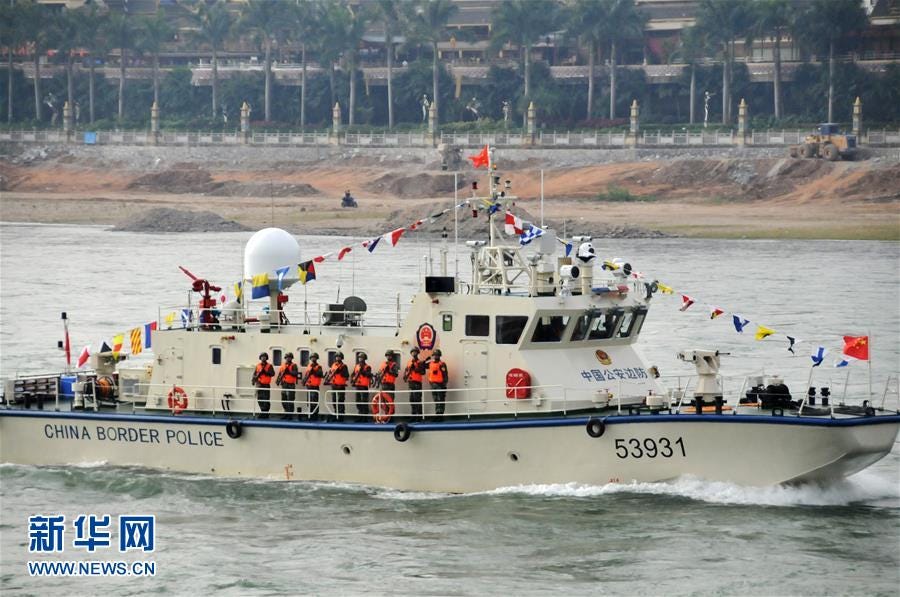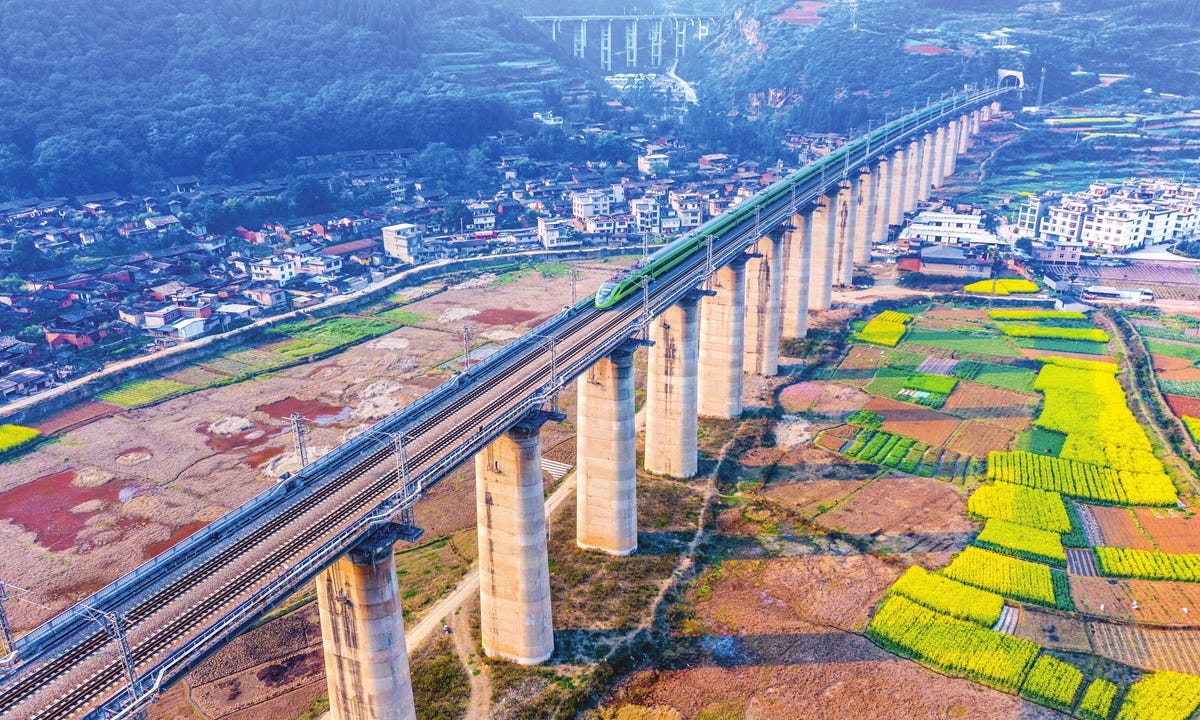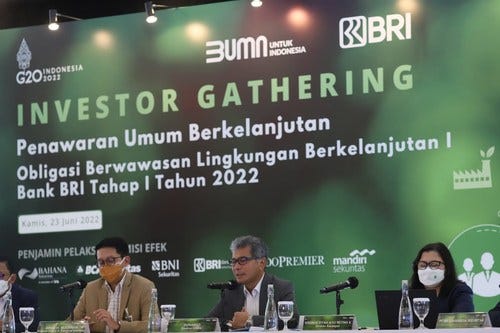Mekong Movements
Kunming biodiversity, Mekong patrols, RMB clearing, Social Security for all, US bombing of Hanoi, Thai corvette sinks, China-ASEAN high and BRI bonds booming
UPDATE: The Long Mekong navigates regional news to bring you stories on the Kunming Biodiversity agreement in Montreal. Mekong patrols are essential for river security and for the 124th time four Mekong countries keep it safe. Laos is all set to boost trade with the launch of RMB clearing facilities. Cambodian sex workers get social security, and it is about time. 50 years ago the US bombed Hanoi, was it more than a mistake? The Thai navy will need to hold a review on safety and start replacing old ships - time to increase ASEAN naval cooperation? Cambodia’s PM says China-ASEAN cohesion has delivered an economic miracle. And, BRI bond issuance underwrites even better economic development for the region.
Adoption of the “Kunming-Montreal Global Biodiversity Framework” (GBF)
I welcome the adoption of the Kunming-Montreal Global Biodiversity Framework today. The adoption of this Framework and the associated package of ambitious targets, goals and financing represents but a first step in resetting our relationship with the natural world.
Success will be measured by our rapid and consistent progress in implementing, what we have agreed to. The entire United Nations System is geared to support its implementation so that we can truly make peace with nature.
For far too long humanity has paved over, fragmented, over-extracted and destroyed the natural world on which we all depend. Now is our chance to shore up and strengthen the web of life, so it can carry the full weight of generations to come. Actions that we take for nature are actions to reduce poverty; they are actions to achieve the sustainable development goals; they are actions to improve human health.
Download the official statement here.
124th joint patrol on Mekong River underway
Law enforcement authorities from China, Laos, Myanmar and Thailand joined forces on Tuesday for the start of the 124th Mekong River joint patrol.
Two Chinese vessels are participating in the operation. They departed Tuesday morning from Guanlei Port, Xishuangbanna Dai Autonomous Prefecture, southwest China's Yunnan Province.
During the patrol, the four countries will continue to focus on cross-border crime crackdowns to ensure safety and stability along the river.
The Mekong River -- known as the Lancang River in China -- is a vital waterway for cross-border shipping.
The China-Laos-Myanmar-Thailand joint patrol and law enforcement mechanism, launched in 2011, is the first joint security cooperation mechanism between the four countries for the Mekong River. It was established to meet the security challenges and better protect the region's environment to ensure the common development of the river basin.
The joint security teams cover Xishuangbanna in China's Yunnan province, the Lancang basin in China and Myanmar, the lower reaches of the Mekong River and the "Golden Triangle", escort goods-carrying ships, and patrol the 337-kilometer-long stretch of the Mekong international waterway and its coastal areas.
The four countries have conducted more than 100 joint patrols, helped maintain security on the Mekong River, escorted commercial vessels on more than 2,000 trips, rescued 130 ships and 536 people in distress, and prevented the hijacking of vessels.
Moreover, the cargo throughput at ports on the river has quadrupled, and the number of tourists increased by more than 20 percent a year. The joint patrol and law enforcement mechanism has also provided security for international waterways and restored order in the Mekong River basin, contributing to the Lancang-Mekong area's prosperity.
But more needs to be done to deepen cooperation, and strengthen joint patrol and law enforcement on the Mekong River, so as to transform it into a river of peace, cooperation and prosperity.
To remove potential safety hazards and ensure the safety of the waterway, cooperation must extend from escorting of vessels to fighting onshore crimes. And security and police cooperation should be expanded to jointly combat drug trafficking, terrorism, arms smuggling, human trafficking, illegal immigration, telecommunication fraud and other criminal activities.
Read Mekong Patrol article here.
Establishment of the RMB clearing bank in Laos
The Lao central bank, Bank of the Lao PDR (BOL), in partnership with the Industrial and Commercial Bank of China (ICBC), held a seminar on RMB clearing in Lao capital Vientiane on Monday.
Sun Fenglei, general manager of the ICBC Vientiane Branch, said at the event that the bank has been working to apply for the establishment of renminbi (RMB) clearing in Laos since 2019 and that the People's Bank of China (PBC), China's central bank, signed a memorandum of cooperation with Lao central bank on the establishment of renminbi (RMB) clearing arrangements in Laos on Sept. 20, 2022.
The ICBC Vientiane Branch, under the guidance of the Lao central bank, held the event to introduce the functions, products and services of the RMB clearing in Laos to customers, said Sun.
More than 400 representatives from the Laos-based financial industry, Chinese and other foreign enterprises in Laos, and local leading enterprises attended the meeting.
In his speech at the seminar, BOL Governor Bounleua Sinxayvoravong pointed out that Laos and China, as close neighbors, have enjoyed a long-standing friendship and both sides will continue to jointly promote the bilateral relations to a new height.
China is the main trading partner of Laos, and the volume of trade and investment continues to expand, said the Lao official.
Bounleua noted that the establishment of the Lao RMB clearing bank in Laos will create a fast, safe, and economical cross-border settlement channel between Laos and China, and it will also make the management of currency flows between Laos and China more systematic.
The establishment of the Lao RMB clearing bank is an important achievement for both the ICBC Vientiane Branch and Laos, he added.
Xiang Fangqiang, charge d'affaires of the Chinese Embassy in Laos, said the current China-Laos relations are in a golden era, and that the successful establishment of the RMB clearing bank in Laos will inject new momentum into the development of economic and trade cooperation between the two countries.
Read full article here.
Sex Workers to receive social security cover
The government has decided that sex workers will receive social security benefits which are currently available to workers in other sectors as well as poor citizens to prevent discrimination against them.
Ieng Mouly, President the National AIDS Authority in Cambodia announced this in a meeting on Friday.
He also said that the authorities will be conducting studies to come up with statistics on the sex workers in the country, including those “inside and outside the system”.
Tia Phalla, Vice-chairman of the National AIDS Authority, said yesterday that the sex workers who are inside the system are those who are freelancing at entertainment premises such as nightclubs and beer gardens while those outside the systems are offering service on their term, mostly in public areas.
He added that those who are working at the entertainment premise will received National Social Security Fund ID cards which allow them to receive the same benefits from the government offered to workers at other registered workplaces.
“They will receive the cards if their workplaces are registered at the Ministry of Commerce, even though they are not full-time employees of the enterprises,” Phalla said.
He also added that the freelance sex workers will be able to receive social equity cards or IDpoor which gives them access to government assistance for those who earned less than $2.9 a day.
“Most of them are poor and never stay in one place for long,” Phalla said. “We will be working with the civil society to identify them because they can be very hard to be traced.”
According to Phalla, there are about 51,000 sex workers in Cambodia with about 3,000-4,000 are operating outside of the system.
Although prostitution is illegalised in the Kingdom, National Committee for Counter Trafficking permanent vice-chairwoman Chou Bun Eng said sex workers who willingly provide services to clients are not considered offenders.
Read the full story here.
US Bombing of Hanoi 50 years ago a “mistake”?
Washington DC (VNA) –The air raids with the mobilisation of B-52 strategic bombers by the US on Hanoi at the end of 1972 was a mistake, said Dr. Andrew Wells-Dang from the US Institute of Peace (USIP).
In a recent interview granted to theVietnamNews Agency, he said the airstrikes, known as the “Linebacker II", was the largest bombing campaign of the US air force after World War II, but it failed completely. By 1968 or even earlier, the US had realised that they could not win the Vietnam War, but Washington still did not give up because it feared losing its credibility during the Cold War.
By 1972, movements calling for peace in the US as well as other countries were increasingly influential. However, negotiations dragged on for years because the US administration prioritised war over peaceful measures. The expert said after the war, Vietnam and the US rebuilt their relationship and the US learned many lessons from the mistakes in the campaign.
During the 12 days and nights of fierce fights in Hanoi in late December 1972 against the US air force, the Vietnamese army and people defeated US airstrikes in the North, shooting down 81 aircraft of all kinds, including 34 B-52s, forcing the US to sign the Paris Agreement on ending the war and restoring peace in Vietnam in January 1973.
Read the full article here.
Thai Navy corvette sinks 76 rescued, 5 dead, 24 missing
Rescuers found a survivor and recovered five bodies from a Thai warship that sank over the weekend in the Gulf of Thailand, navy officials said Tuesday, as hopes faded for two dozen people still missing. Officials acknowledged there were not enough life jackets for all those aboard.
The HTMS Sukhothai, a corvette in service for 35 years, sank Sunday night in rough seas with 105 people aboard. The navy said an earlier tally of 106 people on board was incorrect because one sailor failed to join the journey.
Navy commander Adm. Cherngchai Chomcherngpat said initially at a news conference in Bangkok that two people had been rescued on Tuesday, but later said he had received updated information that only one person was alive and that five bodies had been recovered. According to those figures, 76 people have now been rescued, five have been found dead and 24 are still unaccounted for.
Navy Chief of Staff Adm. Chonlathis Navanugraha said the survivor and the bodies, along with some debris, were found about 60 kilometres (37 miles) from where the ship sank.
Read more on the story here.
China's development tremendously benefits ASEAN: Cambodian PM
Cambodian Prime Minister Samdech Techo Hun Sen said here on Monday that China's miraculous development has greatly benefited the Association of Southeast Asian Nations' socio-economic development.
Speaking after receiving a Lifetime Achievement Award from the Malaysia-based Strategic Institute for Asia Pacific for his contribution to enhancing ASEAN-China relations, Hun Sen said ASEAN-China cooperation has grown steadily over the past three decades and that China is a key supporter for ASEAN's centrality and unity.
"The development of China is a miraculous achievement, which has not only benefited the Chinese people, but also delivered numerous positive benefits to ASEAN and Cambodia in terms of economic, social, and geo-political dimensions," he said.
ASEAN groups Brunei, Cambodia, Indonesia, Laos, Malaysia, Myanmar, the Philippines, Singapore, Thailand and Vietnam. ASEAN and China established dialogue relations in 1991.
Hun Sen said the ASEAN-China cooperation has been opening a new chapter through the implementation of the ASEAN-China Comprehensive Strategic Partnership and the establishment of the ASEAN-China Free Trade Area.
Read full article here.
BRI bonds, ASEAN spurring regional businesses
The tangible growth of the Belt and Road Initiative and Southeast Asia's soaring demand for the latest infrastructure projects will attract more Chinese State-owned enterprises to expand their market presence in the region in the coming years, said analysts and business leaders.
Despite the complex international environment and rising global uncertainties, trade and investment activities between China and the Association of Southeast Asian Nations continue to grow, reflecting the strong bond between the two sides and facilitating regional economic and social development, said Wang Jian, a professor of international trade at the University of International Business and Economics in Beijing.
For example, trade value between China and ASEAN surged by 15.8 percent year-on-year in the first 10 months to 5.26 trillion yuan ($730.61 billion), accounting for 15.2 percent of China's total foreign trade. And China has become the second-largest investor in ASEAN, with its investment in 2021 reaching $14 billion, up 96 percent year-on-year, according to China's General Administration of Customs and Ministry of Commerce.
Invested and built by the Power Construction Corp of China (PowerChina), the first gas turbine of the Kyaukpyu gas-fired combined cycle power station in Myanmar was put into operation in mid-October.
The station has a total installed capacity of 135 megawatts and is equipped with two gas turbine units, two waste heat boilers and one turbogenerator unit.
"Once operational, the project is expected to provide about 1 billion kilowatt-hours of power annually," said Chen Guanfu, president of PowerChina International Group Ltd, an international arm of PowerChina.
The project will be a key power source in Kyaukpyu and will greatly improve power supply capacity in the country, which will help ease power prices while improving living conditions, Chen said.
Read full article here.











